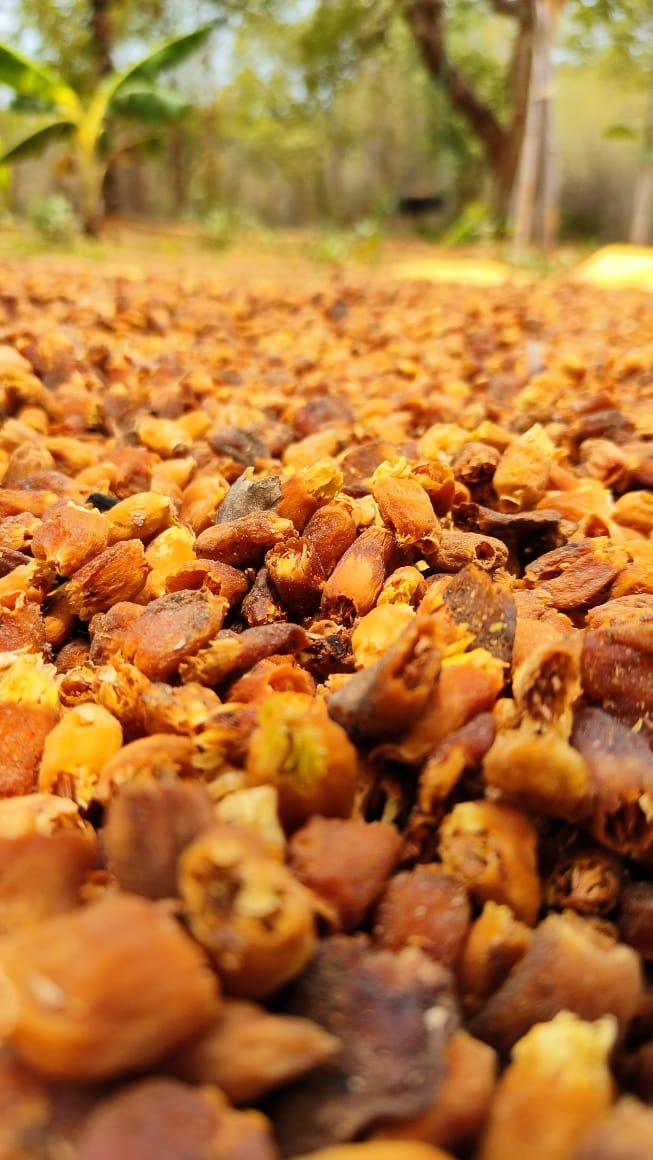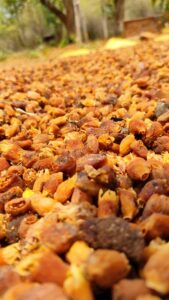Mahua Liquor: Exploring Nature’s Golden Elixir


Mahua is a flowering tree that is native to India, Nepal, Myanmar, and Sri Lanka. It is also known as madhūka, madkam, mahuwa, Butter Tree, mahua, mahwa, mohulo, Iluppai, Mee or vippa chettu. The scientific name of the Mahua tree is Madhuca longifolia.
The Mahua tree is a fast-growing tree that can reach heights of up to 20 meters. It has evergreen or semi-evergreen foliage. The flowers of the Mahua tree are white and fragrant. They bloom in the spring and summer. The fruits of the Mahua tree are yellow or orange and they are edible. They ripen in the fall.
The Mahua tree has many uses. The flowers can be used to make a wine, a liquor, or a jam. The fruits can be eaten fresh or they can be used to make a chutney, a curry, or a pickle. The seeds of the Mahua tree can be used to make a butter or a oil. The bark of the Mahua tree can be used to make a rope or a dye. The leaves of the Mahua tree can be used to make a tea or a medicine.
The Mahua tree is an important tree in India. It is used by many people for food, medicine, and fuel. It is also a sacred tree in Hinduism.
Here are some of the benefits of Mahua:
- The flowers of the Mahua tree are a good source of nectar and pollen. This makes them an important food source for bees and other pollinators.
- The fruits of the Mahua tree are a good source of vitamins and minerals, including vitamin C, potassium, and magnesium. They are also a good source of dietary fiber.
- The seeds of the Mahua tree are a good source of oil. This oil can be used for cooking, skin care, and hair care.
- The bark of the Mahua tree has anti-inflammatory and antibacterial properties. It can be used to make a tea or a medicine to treat a variety of ailments, including fever, colds, and infections.
- The leaves of the Mahua tree are a good source of antioxidants. They can be used to make a tea or a medicine to boost the immune system and protect against disease.
Mahua is a versatile and beneficial tree that has many uses. It is an important part of the Indian ecosystem and culture.
Here are some of the ways that Mahua can be used for human benefit:
- Food: The flowers, fruits, and seeds of the Mahua tree can all be eaten. The flowers can be made into a wine, liquor, or jam. The fruits can be eaten fresh or made into a chutney, curry, or pickle. The seeds can be made into a butter or oil.
- Medicine: The flowers, bark, and leaves of the Mahua tree can all be used to make medicine. The flowers can be used to treat fever, colds, and infections. The bark can be used to treat inflammation and pain. The leaves can be used to treat diarrhea, constipation, and other digestive problems.
- Fuel: The wood from the Mahua tree can be used for fuel. The flowers can also be used to make a biofuel.
- Other uses: The Mahua tree can also be used to make rope, dye, and other products.
Mahua (Madhuca longifolia) offers various nutritional components that can provide potential benefits to the human body. Here are some key nutrients found in Mahua and their associated benefits:
- Carbohydrates: Mahua contains carbohydrates, which are the body’s primary source of energy. Consuming Mahua can provide sustained energy levels, supporting daily activities and physical performance.
- Proteins: Mahua contains proteins, which are essential for growth, repair, and maintenance of body tissues. Proteins are also involved in enzyme production, immune function, and hormone regulation.
- Healthy Fats: Mahua seeds contain healthy fats, including monounsaturated and polyunsaturated fats. These fats contribute to overall heart health, help in the absorption of fat-soluble vitamins, and provide a source of energy.
- Vitamins: Mahua is a source of various vitamins, including vitamin C, vitamin E, and B-complex vitamins (such as thiamin, riboflavin, niacin, and folate). These vitamins play important roles in maintaining immune function, supporting cellular health, aiding in metabolism, and promoting overall well-being.
- Minerals: Mahua is rich in minerals like calcium, iron, potassium, and phosphorus. Calcium is crucial for bone health, iron is essential for oxygen transport, potassium helps in maintaining electrolyte balance, and phosphorus is important for bone and teeth health.
- Antioxidants: Mahua contains antioxidants, including polyphenols, which help protect the body against oxidative stress caused by harmful free radicals. Antioxidants have been associated with reducing the risk of chronic diseases and supporting overall health.
- Nutritional value: Mahua flowers are a good source of protein, carbohydrates, fiber, vitamins, and minerals. They are also a good source of antioxidants.
- Anti-inflammatory properties: Mahua flowers have anti-inflammatory properties that can help to reduce swelling and pain.
- Antibacterial properties: Mahua flowers have antibacterial properties that can help to fight infection.
- Antipyretic properties: Mahua flowers have antipyretic properties that can help to reduce fever.
- Cardiovascular benefits: Mahua flowers can help to improve heart health by lowering cholesterol levels and reducing the risk of heart disease.
- Diabetes benefits: Mahua flowers can help to improve blood sugar control in people with diabetes.
- Eye health benefits: Mahua flowers can help to improve vision and protect against eye diseases such as cataracts and glaucoma.
- Skin health benefits: Mahua flowers can help to improve skin health by reducing wrinkles, age spots, and other signs of aging.
- Hair health benefits: Mahua flowers can help to improve hair health by making it stronger, shinier, and healthier.
Mahua liquor, also known as Mahua Madira, is traditionally made from the flowers of the Mahua tree (Madhuca longifolia). However, it’s important to note that the production and consumption of alcoholic beverages should comply with legal regulations and be done responsibly. Here is some general information about Mahua liquor:
- Production Process: The process of making Mahua liquor involves fermenting the Mahua flowers. The flowers are collected, crushed, and mixed with water to create a sweet, aromatic solution. This solution is then left to ferment naturally for a certain period, typically several days or weeks, allowing the conversion of sugars into alcohol. The fermented liquid is then distilled to increase its alcohol content.
- Tribal Practices: In some tribal communities, Mahua liquor holds cultural and traditional significance. It is consumed as part of rituals, celebrations, and social gatherings. Tribal people may have specific knowledge and techniques for making and storing Mahua liquor, passed down through generations, allowing them to produce and store larger quantities.
- Taste Profile: Mahua liquor is known for its distinct aroma and sweet taste. It carries the floral notes and natural sweetness of the Mahua flowers, which contribute to its unique flavor profile. The taste can vary based on factors such as fermentation time, distillation process, and regional variations.
Tribal communities have traditional methods for making Mahua liquor. While specific techniques may vary among different tribes and regions, here is a general overview of the process:
- Collection of Mahua Flowers: Tribal people gather ripe Mahua flowers during the flowering season. These flowers are typically found on Mahua trees (Madhuca longifolia) growing in the wild or in designated areas.
- Crushing and Fermentation: The collected Mahua flowers are crushed or pounded to extract their juice. The juice is then mixed with water to create a sweet solution. This solution is left to ferment naturally, often in large containers or pits. Fermentation can take several days to a few weeks, depending on environmental conditions and desired alcohol content.
- Distillation: After fermentation, the fermented liquid is distilled to increase its alcohol concentration. Traditional distillation methods involve heating the fermented solution and collecting the vapors that condense into a separate container. This process helps separate alcohol from other components, resulting in a more concentrated liquor.
- Aging and Storage: Once the distillation process is complete, the Mahua liquor may be aged or stored to enhance its flavors. It is often stored in earthenware containers, wooden barrels, or glass bottles to allow further maturation and development of desired taste profiles.
It’s important to emphasize that making alcoholic beverages at home can involve complex processes, legal implications, and potential risks. It is always advisable to consult local laws and regulations governing the production and consumption of alcohol in your area. Additionally, responsible alcohol consumption and adherence to legal age restrictions are vital to prioritize personal well-being and community safety.
We have a few wild Mahua trees at Bagdara and will be happy to send some Mahua fruit to you on request. Contact us and show us your interest.

